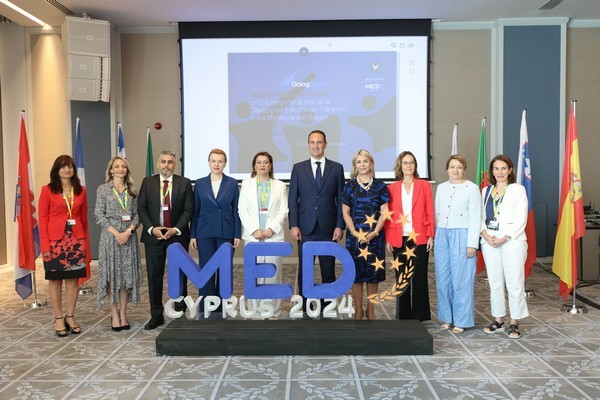Press Releases

03-07-2024 15:20
MED9 Ministerial Summit for Education for Sustainable Development and Green Transition in the Mediterranean Region
Non-Official Paper on Conclusions & Recommendations
(APPROVED ON 27 JUNE 2024)
In the framework of the MED9 initiative, the Ministers and high level officials of the Ministries of Education of the nine Mediterranean EU Countries convened in Limassol, on 27 June 2024, invited by the Government of the Republic of Cyprus, which also holds the Chair of the Mediterranean Committee on Education for Sustainable Development (MCESD), to discuss further how ESD can be strengthened collectively in the MED9 countries and act as a key driver for the Green transition, and for creating more resilient, just and sustainable societies.
The Ministers, informed and assisted in their deliberations by high officials and experts of their countries and IGOs, NGOs, Academia and other stakeholders and facilitated by the Secretariat of the MCESD, concluded (unanimously) that:
The complex and serious challenges the Mediterranean Region is facing as a result of accumulated old and emerging environmental, socioeconomic and geopolitical issues require urgent and effective mitigating measures.
The global triple crisis (climate change, biodiversity loss and environmental pollution) is particularly visible in the Mediterranean, the South and Eastern interface of Europe with Africa and Asia, the area that warms faster than any other region of our planet with the exception of the Arctic.
This situation requires urgent, coherent, coordinated and effective action at all governance levels, from global and regional/Mediterranean, to national and local. Effective mobilization and commitment is needed by all State and non-State actors. In this respect and for the promotion of the Agenda 2030 and the achievement of the ambitious EU targets, formal, non-formal and informal ESD/public awareness, should be employed, understood as more than “education on SD”. It is, in fact, the least expensive and most powerful tool and prerequisite for effective management of the aforementioned crises and for achieving the SDGs and sustainable development overall.
The progress in ESD introduction and implementation reported in the meeting is significant, as it concerns mobilization at all educational levels, with many improvements in curricula and with many extracurricular activities, including outdoor and non-formal activities with the involvement of stakeholders. Nevertheless, the needs are enormous and a lot of effort is still necessary for the proper implementation of the Action Plan Towards 2030 of the Mediterranean Strategy on ESD.
Furthermore, ESD at the level of Higher Education, as well as at the vocational level, is urgently needed for appropriately preparing the future generation of decision makers and practitioners, through advancing their knowledge and skills, to be able to successfully address the challenges ahead.
For ESD to deliver the expected results, it needs to become a “whole of Government” priority, appropriately embedded in EU and national policies with adequate human and financial resources. The importance of the role the MED9 Education Ministers can play is twofold: promoting within the EU Education Council the Mediterranean priorities and sharing their collectively agreed views with their fellow Ministers of the non-EU Mediterranean countries at appropriate occasions.
All the priority thematic issues identified in the Action Plan Towards 2030 of the Mediterranean Strategy on ESD, adopted at the 2nd High Level meeting of the Ministers of Education organized in Cyprus on the 6th of October 2022 during the 9th Ministerial “Environment for Europe” Conference, have been reconfirmed as important, with most urgent themes being Climate Change Education linked to energy use reduction, efficiency and the shift to renewable energies, biodiversity/nature/ecosystem conservation and restoration, the Water-Energy-Food-Ecosystem (WEFE) Nexus, the proper use of safe, treated waste waters and Ocean Literacy. Many references were also made to the need for cultural, socioeconomic, democratization, gender and youth related issues to be horizontally developed as cross cutting themes.
The importance of peace, security, and human rights was confirmed with particular emphasis given to three processes that can enrich, facilitate and substantially upgrade the implementation of ESD in the Mediterranean region:
The deeper understanding, wider and better dissemination and implementation of the WSA/WIA[1].
The Action Plan target for 50% of the schools in each country to have adopted WSA by 2026 seems to be still feasible - at least for the schools of the MED9 countries - if concerted efforts are invested, supported by a systematic training of trainers. The four basic WSA directions gravitate to: curricula, school governance (including vision, adopted pedagogies, etc.), the school as a showcase of sustainability and the close relationship with the society, providing the foundations from which variations emerge that serve local specificities.
The Ministers suggested that the MCESD prepares a document for wide dissemination, available also on-line, describing a set of appropriate interventions (including reported good practices) on critical issues relating to WSA/WIA, such as: energy efficiency, waste management, water management, actions related to nature conservation and restoration including school gardens and green campuses; alternative mobility/transportation, health/nutrition/canteen management; as well as activities related to behavioral changes such as promotion of dialogue for consensus building, respect of differing opinions, promotion of action for the green transition at school, neighborhood and community levels, that includes participatory science, the engagement of specific sectors (e.g. farmers), etc.
A three-year scheme for visits and exchanges on WSA/WIA among school directors of the Mediterranean countries, to be supported by the EU and/or donors is also proposed.
Twin Transition: Digital and Green/Sustainable Learning
It became evident that currently in most countries, the digital transition does not follow the efforts for a green/sustainable learning. Despite relevant efforts at EU level, the link is still difficult for most educators to fully understand and deliver since they lack adequate combined skills for both areas.
The “twining” is expected to harness digital technologies in order to improve learning for sustainability in schools, and beyond the classroom, as well as for advancing learners’ interaction, participation, knowledge and competences.
Challenges and tension related to carbon and water footprints and e-waste of information technologies, as well as on the eventual imbalanced impacts of digital technologies (e.g. AI) on learners and the educational process in general, were also noted as areas requiring deeper reflection (considering the EU AI Act), without, however, questioning the necessity of learners to be equipped and competent for the new digital era.
To achieve a fast and balanced “twining” process, emphasis should be given to properly combined sustainability and digital training of Mediterranean educators.
Strengthening Cooperation, Networking and Financing for ESD
The Mediterranean region benefits from many cooperation initiatives of individual countries, of the EU and of various international organisations. It is also a non-UN region that has managed to be a model at global level, with a comprehensive Strategy on ESD, an updated Action Plan Towards 2030 and an extended cooperation and networking system on ESD, among countries, international organisations and stakeholders, all of them actively participating in the Mediterranean Committee of ESD.
This framework needs to be further strengthened, supported and utilized for effectively facilitating interactions and projects proposed by countries, international organizations and stakeholders and included already in the approved Action Plan Towards 2030. Among them, there are 18 proposed regional programmes and 19 identified priority thematic issues for ESD in the Mediterranean region, suitable for cooperation, provided that adequate funding from public and private sources becomes available.
Relevant Press Releases

22-11-2024 11:25
The “Royal Chapel” of Agia Aikaterini at Pyrga closed for the public



04-11-2024 13:18
Announcement by the Cyprus Academy of Sciences, Letters, and Arts



